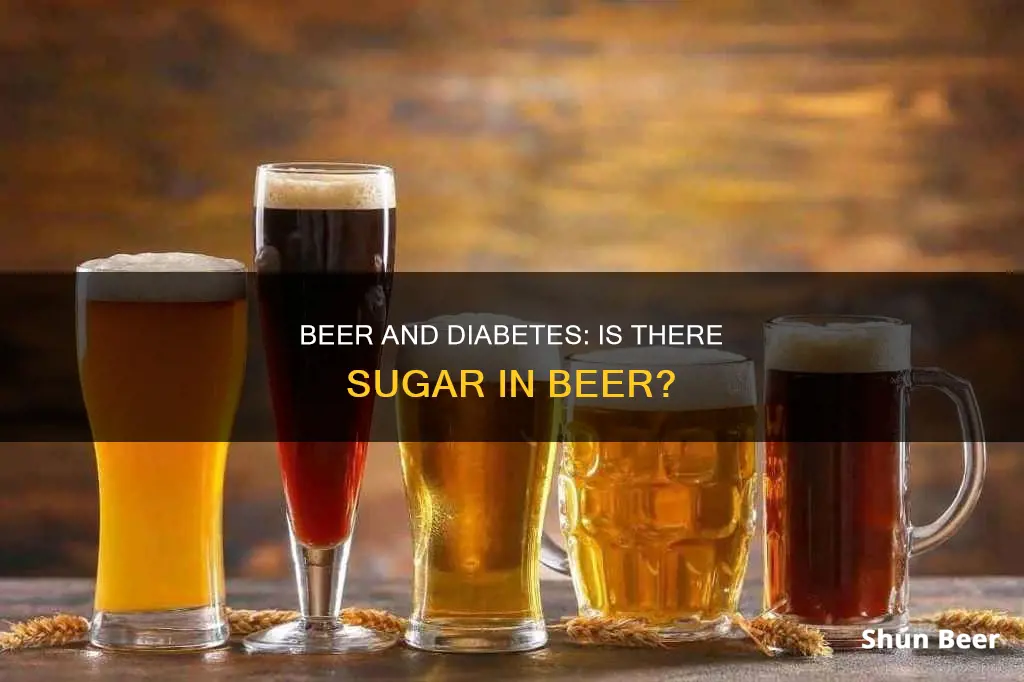
People with diabetes can still drink beer, but it's important to be aware of how it can affect your body and how to manage this. Beer is a significant source of carbohydrates, so it can impact blood sugar levels. Depending on the type, it can also be high in calories, so drinking beer may contribute to weight gain over time. Some types of beer can be higher in alcohol, too. According to the ADA, drinking alcohol can slow down carb metabolism, potentially leading to low blood sugar (hypoglycemia).
| Characteristics | Values |
|---|---|
| Carbohydrates | 13 grams on average, per a 12-ounce can of beer |
| Calories | 150 calories per can |
| Alcohol content | 5% alcohol per 12 fluid oz (360 ml) |
| Recommended intake | No more than 1 drink per day for women and no more than 2 drinks per day for men |
| Hypoglycemia prevention | Don't drink on an empty stomach; eat food while drinking and monitor blood sugar |
| Best types of beer for diabetics | "Light" beers, dry wines or champagne, and diet or sugar-free mixers with spirits |
What You'll Learn
- Beer is high in calories and carbohydrates, which can cause blood sugar spikes and weight gain
- Alcohol competes with the liver's ability to produce glucose, causing hypoglycaemia
- Drinking on an empty stomach can increase the risk of hypoglycaemia
- Beer raises blood sugar levels as it contains sugar in the form of maltose or maltodextrin
- Drinking excessively can lead to high blood pressure, cardiac arrest, and other health issues

Beer is high in calories and carbohydrates, which can cause blood sugar spikes and weight gain
Beer is a significant source of carbohydrates, which can cause blood sugar spikes, and it is also high in calories, which can lead to weight gain.
A 12-ounce can of beer has, on average, 13 grams of carbohydrates, according to the USDA. This is nearly one carb serving, which is 15 grams of carbs. Beer also contains sugar in the form of maltose or maltodextrin, and the higher the amount of carbohydrates in alcohol, the greater the risk of developing high blood sugar. A can of beer has approximately 150 calories, but because of its low alcohol content, people often end up drinking several glasses, consuming almost 600 calories. These empty calories do not provide your body with proteins, fats, minerals, or vitamins. Since a can of beer has about 15 grams of carbohydrates, drinking four cans will result in consuming about 60 grams of carbs.
Beer is also often accompanied by snacks such as peanuts or chips, resulting in a high-calorie meal. If you have Type II diabetes and your sugar levels are already high, this could be a toxic overload. Beer is also a diuretic, which means it depletes the body's electrolyte balance, so it is important to hydrate between drinks.
Additionally, alcohol interferes with the liver's ability to produce glucose. If you drink too much, your blood sugar levels will drop, and you could get hypoglycemia (low blood sugar). You will then need to consume sugar to elevate your blood sugar levels, which may result in excess sugar, depleted insulin, or insulin resistance.
To avoid hypoglycemia, it is recommended to drink beer with a low-carbohydrate snack and to choose low-calorie or mild beers. It is also important to drink slowly and hydrate with water between alcoholic drinks.
Beer and Sugar: What's the Connection?
You may want to see also

Alcohol competes with the liver's ability to produce glucose, causing hypoglycaemia
Alcohol can cause hypoglycaemia in people with diabetes. This is because the liver, where glucose is stored, is also responsible for clearing alcohol from the body. When the liver is busy breaking down alcohol, it may be delayed in releasing necessary sugars into the bloodstream. This can lead to low blood sugar (hypoglycaemia).
The liver plays an important role in blood glucose regulation by steadily releasing glucose into the blood throughout the day. It carries a stored form of glucose called glycogen, which it can convert into glucose to be released into the bloodstream. When we drink alcohol, it can inhibit the liver's ability to release glucose. This means that the liver may not be able to release enough glucose to keep blood sugar levels from dropping too low.
The effect of alcohol on the liver can last for several hours after drinking, so it is important for people with diabetes to monitor their blood sugar levels regularly when consuming alcohol. Drinking on an empty stomach or when blood sugar levels are already low can increase the risk of hypoglycaemia. It is also important to be aware of the symptoms of hypoglycaemia, which can include feeling dizzy or lightheaded, and loss of consciousness in more extreme cases.
To prevent hypoglycaemia when drinking alcohol, it is recommended to not drink on an empty stomach, limit alcohol consumption, drink at a slow or moderate pace, and monitor blood sugar levels. It is also important to speak with a doctor about drinking alcohol if taking any medications or having any other medical conditions.
Beer vs. Chardonnay: Which Has More Sugar?
You may want to see also

Drinking on an empty stomach can increase the risk of hypoglycaemia
Drinking alcohol on an empty stomach can also affect the liver's ability to release glucose into the bloodstream. The liver is crucial for maintaining optimal blood sugar levels, and when we drink, it prioritises breaking down alcohol over releasing glucose. This means that drinking on an empty stomach can result in lower blood sugar levels, increasing the risk of hypoglycaemia.
Additionally, drinking on an empty stomach can be dangerous for people with diabetes, as their liver may not be able to produce enough glycogen to prevent blood sugar levels from falling too low. This is especially true for those who go to bed without consuming additional carbohydrates after drinking, as studies have shown that hypoglycaemia can occur overnight.
To prevent hypoglycaemia, it is recommended to avoid drinking on an empty stomach and to consume food while drinking. It is also important to monitor blood sugar levels and stay hydrated. For those with diabetes, it is crucial to be mindful of the effects of alcohol on blood sugar and to discuss any concerns with a healthcare professional.
Beer and Sugar: The Surprising Truth About Your Brew
You may want to see also

Beer raises blood sugar levels as it contains sugar in the form of maltose or maltodextrin
Beer is a significant source of carbohydrates, so it can impact blood sugar levels. According to Anjali Peswani, a nutritionist, "Beer raises blood sugar levels as it contains sugar in the form of maltose or maltodextrin." The sugar content in beer can cause a spike in blood sugar levels, especially for people with diabetes.
Beer typically contains 13 grams of carbohydrates per 12-ounce can, which is considered a standard serving. The high carbohydrate content in beer can be risky for diabetics, as it can lead to high blood sugar levels. The liver is responsible for clearing alcohol from the body, and this process can slow down carb metabolism, potentially leading to low blood sugar or hypoglycaemia. Drinking alcohol when taking diabetes medications can exacerbate this effect. Therefore, it is essential for people with diabetes to be mindful of their alcohol consumption and its impact on their blood sugar levels.
The impact of beer on blood sugar levels is important to understand for people with diabetes. Beer contains sugar, which can cause a spike in blood sugar levels. The liver's role in processing alcohol can also affect the release of glucose into the bloodstream, leading to potential hypoglycaemia. It is crucial for people with diabetes to monitor their blood sugar levels and make informed decisions about alcohol consumption.
Additionally, the type of beer and the amount consumed can also affect blood sugar levels. "Light" beers tend to have fewer carbohydrates, usually five grams or less per serving, while craft beers like IPAs and stouts can have 15 grams or more. The alcohol content in beer can also vary, with "light" beers having a lower alcohol content, which may lead to consuming multiple servings and, in turn, more carbohydrates. Therefore, it is recommended to stick with light beers and limit consumption to one serving to minimise the impact on blood sugar levels.
In conclusion, beer raises blood sugar levels due to its sugar content in the form of maltose or maltodextrin. The impact of beer on blood sugar levels is particularly important for people with diabetes, and it is crucial to consume it in moderation and monitor blood sugar levels accordingly.
Beer and Blood Sugar: What's the Connection?
You may want to see also

Drinking excessively can lead to high blood pressure, cardiac arrest, and other health issues
Beer is not off-limits for diabetics, but it's important to be mindful of the amount consumed and the type of beer. "Light" beers are recommended for diabetics as they have fewer carbs, calories, and alcohol content. For instance, a Miller Lite has 3.2 grams of carbohydrates in a standard 12-ounce serving, compared to 12 grams in regular Miller beers. Similarly, Bud Light has fewer than 5 grams of carbs per serving, while a regular Budweiser has 10.6 grams.
However, it's crucial for diabetics to be cautious when drinking beer or any other alcoholic beverage. Alcohol interferes with the liver's ability to produce glucose when blood sugar is low, which can lead to hypoglycemia. Additionally, alcohol can impair judgment, making it difficult to recognize the symptoms of low blood sugar. To prevent hypoglycemia, it's recommended to eat before drinking, monitor blood sugar levels, and not exceed the recommended alcohol intake of one drink per day for women and up to two drinks per day for men.
Excessive drinking can lead to serious health issues, including high blood pressure, cardiac arrest, and other cardiovascular problems. Heavy drinking is defined as consuming six or more drinks on one occasion, feeling a hangover or drunkenness, needing a drink in the morning, experiencing disruptions in daily life due to drinking, or having concerned family members or loved ones. Heavy drinking can cause heart tissue damage even before noticeable symptoms arise, increasing the risk of heart failure, high blood pressure, heart attack, arrhythmias, stroke, and death.
A study published in the Journal of the American Heart Association examined blood samples from 2,525 adults and found that those with the heaviest drinking habits had significantly higher markers for heart injury, stretching of the heart wall, and inflammation. Another study of middle-aged British men found that heavy drinkers had a higher incidence rate of sudden cardiac death, even if they didn't exhibit a high rate of fatal heart attacks. Therefore, it's important to drink in moderation and seek help if cutting back on alcohol is challenging.
Beer and Sugar: What's the Connection?
You may want to see also
Frequently asked questions
Yes, diabetics can drink beer, but it is important to do so in moderation and to be aware of how it can affect your blood sugar levels. Beer is a significant source of carbohydrates, so it can impact blood sugar. It is recommended to limit your intake to one to two 12-ounce beers per day.
Beer can cause a quick spike in blood sugar levels as it contains sugar in the form of maltose or maltodextrin. Additionally, drinking alcohol can slow down carb metabolism, potentially leading to low blood sugar (hypoglycemia).
Excessive alcohol consumption increases the risk of chronic diseases such as heart disease, liver disease, and kidney disease. For diabetics, drinking can also lead to a dangerous drop in blood sugar levels, as alcohol interferes with the liver's ability to release glucose.
Yes, there are several alternatives that may be better options for diabetics. These include light beers, which have fewer carbohydrates, calories, and alcohol content. Dry wines and champagne are also lower in sugar, as are distilled spirits such as gin, rum, vodka, and whiskey.
According to the Dietary Guidelines for Americans, moderate alcohol consumption is defined as up to one drink per day for women and up to two drinks per day for men. However, it is important to note that excessive alcohol intake is associated with an increased risk of type 2 diabetes.







